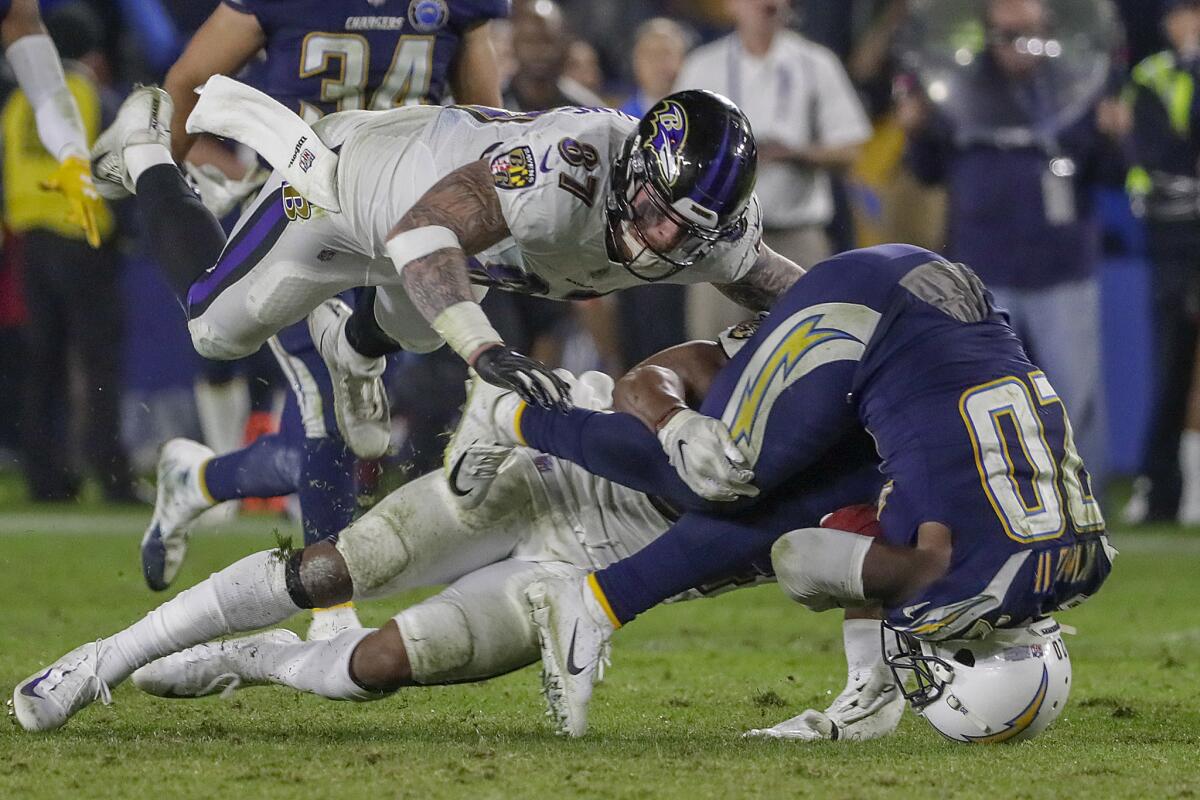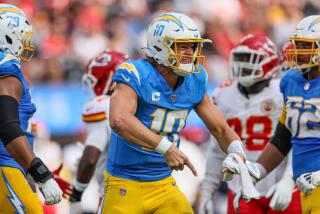It appears Chargers will have a rematch with Ravens in first round of NFL playoffs

- Share via
With one loss, the Chargers went from looking to be the No. 1 seed in the AFC to looking at a completely different postseason fate — one more worrisome and entirely less inviting.
They could open the playoffs in Baltimore against a Ravens team that just bull-rushed and battered them into submission.
“If we do, then we do,” running back Melvin Gordon said. “We’ll [maybe] see them in a couple of weeks. Can’t run from it. We made our road. It’s going to be a little bit tougher now. … We just have to come out and play.”
The Chargers remain in contention for the West title, a possibility kept alive when Kansas City lost in Seattle on Sunday night. But the Chiefs still hold the tiebreaker, giving them a decided advantage entering Week 17.
Baltimore’s chances of winning the North and hosting the higher-seeded wild-card entrant increased Sunday when Pittsburgh lost at New Orleans.
If the Ravens win the division, that would set up a rematch of Chargers-Ravens in the first weekend of January.
Given what transpired Saturday night during Baltimore’s 22-10 victory at StubHub Center, the Chargers will have a lot of adjustments, mental and physical, to make over the next two weeks.
Against a Ravens team rooted in defense and running the ball, the Chargers never looked comfortable, led for only one minute and permitted Baltimore to dictate everything from the game’s pace to its outcome.
“They played their game,” coach Anthony Lynn said. “We couldn’t get them off the field on defense, and we couldn’t stay on the field on offense.”
Said quarterback Philip Rivers: “I think what I had in my head, ‘There’s no three and outs.’ You get first downs every time. … But we didn’t even get it going. We just didn’t.”
Given their recent history, the Chargers struggled to move the ball in epic fashion, finishing with 198 yards.
The output marked only the 11th time since 2000 and fourth time since Rivers became the starter that the offense was limited to fewer than 200 yards.
“There’s a reason why they’re the No. 1 defense in the NFL,” Gordon said of the Ravens. “They played us well. They’re the better team, for sure.”
On the plus side, in his first game back since suffering a right knee sprain, Gordon reported himself to be healthy afterward. He finished with 41 yards in 12 carries.
Still, in the end, there was very little positive Saturday for the Chargers, no matter how much some of them tried to spin the narrative that way.
“It doesn’t matter how you get in,” rookie safety Derwin James said of the playoffs. “You don’t have to be the No. 1 seed to do what you want to do; the goals you have for your team. It doesn’t matter what seed we are.”
In theory, perhaps. But in reality, it seems to matter plenty. Over the last decade, only one team seeded lower than fourth has reached the Super Bowl.
The 2010 Green Bay Packers won the NFL title as the NFC’s second wild-card team and No. 6 seed.
Ravens went long
The seven longest plays from scrimmage Saturday belonged to the Ravens and the offense that was considered to be the less potent of the two entering the game.
The Chargers didn’t have a play that gained more than 17 yards. They did have two Rivers completions that netted 28 and 27 yards in the first quarter but they were erased by penalties.
“It is frustrating,” Rivers said of the repeated infractions. “It’s part of it. You don’t want to always point to that, but that was part of it — not executing as well as we can and need to.”
The Ravens continually pressured Rivers by blitzing and, at times, overwhelming the Chargers’ offensive front.
Baltimore finished with four sacks for losses totaling 34 yards on a night when gains were hard to come by.
“We’re going to be very disappointed in the way we played this game,” center Mike Pouncey said when asked what he anticipated seeing in review. “We gotta do a better job as an offensive line picking those kinds of blitzes up.”
Falling behind
As has been their habit, the Chargers were forced to play the majority of the game trying to come from behind.
Baltimore converted a Rivers interception on the game’s first play into a 24-yard Justin Tucker field goal 2 minutes 17 seconds into the opening quarter.
“That’s not the winning formula this time of year, especially when you’re playing playoff football teams,” Pouncey said. “You got to come out and start fast and finish the game the right way.”
The Chargers did make it back against the Ravens, moving ahead 13-10 on Gordon’s one-yard touchdown run early in the third quarter.
But the normally plodding Baltimore offense needed only two plays to recapture the lead. Lamar Jackson passed to fellow rookie Mark Andrews for a 68-yard touchdown. The Chargers never led again.
“We knew they would push back,” Lynn said. “We knew the game wasn’t over when we took the lead. They scored quick. … We still had plenty of opportunities to come back.”
Twitter: @JeffMillerLAT
More to Read
Go beyond the scoreboard
Get the latest on L.A.'s teams in the daily Sports Report newsletter.
You may occasionally receive promotional content from the Los Angeles Times.







